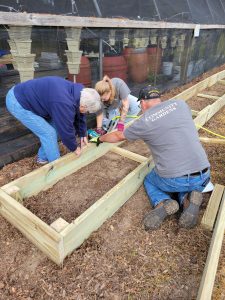What is the first thing that comes to mind when you think about community gardening? You may be picturing a patch of land dedicated to growing fruits and veggies collaboratively, or a collection of individual plots. And you would be correct. But if you take a closer look, you will see much more than plants. These spaces are about opportunity, community gardens have positive impacts on physical health, culture, economy, and environment.
Community Gardening and Physical Activity
Check in with yourself, how are you feeling? Do a mental scan, right now where you are. Start at your toes and end with the top of your head – how is your body feeling? Something that might help is getting time outside, whether you are gardening or not.
Whether you have never touched a plant or are a gardening pro, there is no denying the benefits gardening has on our minds and bodies. Try it; you might surprise yourself.
Picture this: you are outside, digging in the soil, scouting for pests, planting seeds, and picking ripe veggies you grew yourself. By doing the tasks it takes to maintain your garden plot, you are giving your body a workout without even realizing it. Beyond eating the healthy produce you grow, there are many health benefits to gardening, especially within your community!

When you roll up your sleeves and garden, you are doing more than ensuring the health of your plants, you are positively impacting your own health. You may even consider your local community garden a secret gym! Digging, planting, weeding, and harvesting are not just fun chores; they are exercises in disguise. By tending to these green spaces, you are also tending to your physical health. Improving your wellness, or overall health, is just one of many research proven benefits of being involved in your local community garden.
Gardening is Power
We all know the saying, “knowledge is power”, This is especially true when it comes to our health. That is why the community gardens program, offered by UF IFAS Extension Pasco County, hosts workshops, educational sessions, and demonstrations on nutrition, cooking, and the myriad health benefits of fresh produce.
By empowering participants with information, these gardens become more than just patches of soil. These spaces become facilitators of healthier lifestyles and stronger communities, while decreasing food costs and supporting food systems and households.
Conclusion
In conclusion, community gardening offers numerous health benefits by providing access to fresh, nutritious food, encouraging physical activity, reducing stress, and fostering a sense of community, while decreasing food costs. By participating in community gardens, individuals can improve their overall well-being while also contributing to the health and vitality of neighborhoods.
Supervising agent: Dr. Whitney Elmore County Extension Director, Urban Horticulture Agent, and Master Gardener Manager
Have a question?
If you have any questions about gardening in Central Florida, please contact the UF/IFAS Extension Pasco County at 352-518-0156. For more information on UF/IFAS Extension Pasco County Community Gardens, and how you can join one, visit http://sfyl.ifas.ufl.edu/pasco/.
Follow us!
We have several ways to connect. Visit our Facebook, Instagram, Eventbrite, Blogs, Florida-Friendly Facebook, Website
More resources:
- UF/IFAS Extension Pasco County
- Dr. Whitney Elmore’s Podcast: Rooted in Florida
- The Value of Community Gardens: Social Impact
- The Value of Community Gardens: Cultural Impact
Read more in our series:
- The Value of Community Gardens: Social Impact
- The Value of Community Gardens: Cultural Impact
- The Value of Community Gardens: Mental Health Impact
- The Value of Community Gardens: Health Impact
 3
3
